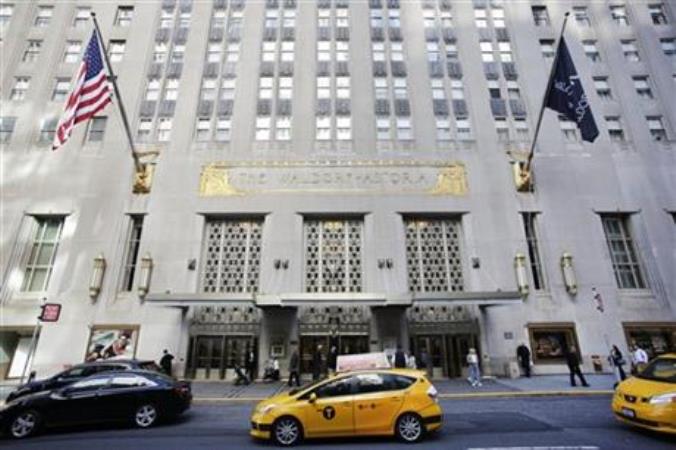
It's official. The U.S. government says it's abandoning decades of tradition and moving out of New York's famed Waldorf-Astoria Hotel, which a Chinese firm bought last year from Hilton Worldwide.
Instead, President Barack Obama, White House staff and the sizable State Department contingent that trek to Manhattan every September for the annual U.N. General Assembly will work and stay at the New York Palace Hotel. The AP first reported the impending move in June but it wasn't formally announced until Friday, a day after the final contract was signed with the Palace.
Officials say the change is due in large part to concerns about Chinese espionage, although State Department spokesman Mark Toner would say only that it followed a review "to take into account changing circumstances" that included "possible security concerns."
"The U.S. delegation will lodge at and operate out of the New York Palace Hotel during the U.N. General Assembly high-level week this fall," Toner said. "We constantly re-evaluate venues to take into account changing circumstances. In making our decision we considered numerous factors, including space, cost, the needs of the United States government and any possible security concerns."
In addition to the switch for the U.N. meeting, Toner said the department is also considering whether the Waldorf should still serve as the residence of the U.S. ambassador to the United Nations as part of a review of "our security protocols and standard operating procedures to ensure the safety and security of our information and personnel."
The hotel has served as the home of the ambassador to the UN since 1947.
"We are evaluating our options," Toner said. "The decision about the location of the U.S. Ambassador's residence must necessarily take into account numerous factors, including costs, the needs of the United States government and the U.S. Mission to the UN, as well as any possible security concerns."
U.S. law allows the department to rent the ambassador's residence for a term of 10 years or less. The current lease expires next year with an option to renew for one or two years.
U.S. officials have pointed to Hilton's sale of the Waldorf-Astoria to China's Beijing-based Anbang Insurance Group for $1.95 billion last year as having prompted the security concerns.
Terms of the sale allow Hilton to run the hotel for the next 100 years but also call for "a major renovation" that officials say has raised eyebrows in Washington, where fears of Chinese eavesdropping and cyberespionage run high.
The U.S. suspects China-linked hackers were behind a recent massive breach of federal personnel records that compromised the data of millions of government workers.
At the time of the October 2014 sale, officials said it could have implications for the U.S. government's longstanding relationship with the hotel. They said decisions about the relationship would be made on cost, Anbang's plans, the government's needs and security concerns with an eye on the renovation project.
The State Department routinely warns U.S. diplomats in China about physical and electronic surveillance and tells American citizens in the country to be aware of similar risks, notably in hotels.
"Hotel rooms (including meeting rooms), offices, cars, taxis, telephones, Internet usage and fax machines may be monitored onsite or remotely, and personal possessions in hotel rooms, including computers, may be searched without your consent or knowledge," the department's travel advice for China says.
"Business travelers should be particularly mindful that trade secrets, negotiating positions and other business-sensitive information may be taken and shared with local interests," it says.
The New York Palace hotel is owned by South Korean investors.
